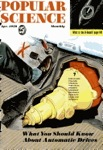 Google books has just taken a step beyond books by making complete magazine archives available!
Google books has just taken a step beyond books by making complete magazine archives available!
The magazine archives contain the complete contents, including the original ads, of long runs of numerous magazines. In the case of magazines that are still being published, the archives won't contain the most recent issues, but that still leaves many issues! For example, the Popular Mechanics archive contains every issue from 1905 to 2005 - a full 100 year run!
At this writing, there's no way to list all the available magazines, but below is a list I've put together by searching the site and getting links from others. If you find any magazine in the Google books archive that aren't listed here, please let me know in the comments! Also, feel free to copy and expand this list (you'll probably have to view the source code of this entry in your browser to do so).
Already I've been perusing these magazines for items of interest to my Grey Matters readers.
Going back just a few months, we find that the March 2008 issue of Prevention called We Never Forget Anything (Anymore) (Part 1, Part 2, Part 3, Part 4, Part 5). This is about the different memory problems of four women, what approaches they took, and the results they achieved. This is a great approach in making a technical subject like memory training far more appealing.
Jumping back exactly two more years, Women's Health's March 2006 issue featured 5 quick tricks to help you remember specific things better, called Total Recall (Part 1, Part 2). Above and beyond standard memory techniques, these are quick tips that can help improve your memory in many common situations.
Ebony Jr., a children's version of Ebony magazine, had an October 1981 article called The Mysterious Matter of Memory (Part 1, Part 2). While the information in it is somewhat basic, the article itself is an excellent lesson on how to talk to kids about a complex subject like memory. Speaking of children and memory, this article did bring to my mind the old 1972 Sesame Street animation about a young girl who has to remember the 3 things her mother wants from the grocery store. I hadn't thought of that in a long time. Talk about the effects of long term memory!
Our next jump takes us all the way back to the 1930s! Popular Science, in a September 1936 article after my own heart, published Memory Experts: Made To Order (Part 1, Part 2, Part 3). It discusses how many extraordinary feats can be achieved with less training than most people would think. It also includes some ways to test your own memory! Obviously, the author John E. Lodge is a kindred soul to Grey Matters from long ago.
Memory must have been a popular topic in the mid-1930s, because more than a year earlier, Popular Mechanics published an article titled Have you a Master Memory? (Part 1, Part 2, Part 3), which went into more detail about specific mnemonic techniques than any of the other articles here. It even includes an approach for the Day of the Week For Any Date feat!
Looking through the magazines, there are also numerous ads for memory courses. Yes, Harry Lorayne is well known for his memory books today, but it's fun to see his ads in older magazines. On declares, "I'll make you a mental wizard in one evening!", while another grabs you with, "Let this machine work on your mind for one evening..."
The ada I most frequently found for memory training were those for the still-available Roth Memory Course (If you take inflation into account, the price of this book has actually gone down!). The Roth ads usually used the headline, "Why My Memory Rarely Fails Me," in single-page and two-page versions. There was also the mysterious-looking "A Startling Memory Feat You Can Do" ads, which teased you with the ability to memorize 25 items!
Another approach for Roth ads included "Memory Power Instead of Memory Tricks", which touted the superiority of his course over external artificial memory aids. However, I can't help but wonder if the most successful ads were the ones that promised more money and better jobs, such as "Why He Earns $30,000 a Year" (akin to making $430,000/year in 2008!) and "The Man With a Million Dollar Memory".
There's far more than I could include in a single entry, but these are the highlights. As I uncover more articles and ads of interest, I'll post them in future entries. For now, I'm going off to add these entries into an upcoming edition of my Memory Effects list.




1 Response to Free Magazine Archives From Google Books!
"He is David M. Roth, the most famous memory expert in the United States." said my friend Kennedy, answering my question before I could get it out. "He will show you a lot more wonderful things than that before the evening is over."
I say!!
Post a Comment